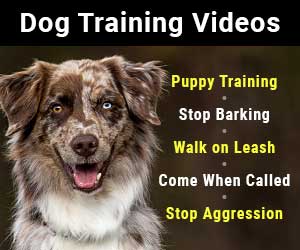
Dog Barking Driving You Crazy? With Proper Dog Training Barking Can Be Curtailed
In dog training barking control is one of the most popular objectives. Simply put, many people become irritated when their dog barks a lot or seemingly for no good reason and they want to train their dog to avoid this particular behavior. It's a perfectly reasonable idea, but as with all dog training there is a right way and a wrong way to go about it, so you need to proceed with caution.
Before you start training your dog not to bark it's important to consider the reasons for barking because not all of them are unnecessary. While there are certainly times when barking is not needed or wanted, at other times there is a good reason for it. This can include warning off intruders, letting you know when he needs to go out or, in herding breeds like the Australian Shepherd, using a bark to move groups of animals.
You never want to discourage barking at the proper time but likewise you don't want to seem as if you are rewarding nuisance barking. This is what makes dog training barking commands so tricky to learn. It's not as simple as reacting when your dog barks, it's also a matter of learning to interpret what the barking means, much the same as you do for the cries of a newborn.

dazb75 / stock.adobe.com
Is your dog's barking driving you (and your neighbors) crazy? It may be time to reestablish yourself in the leadeship role which can solve not only barking but a multitude of behavior problems!
Puppies who are crate trained, for instance, may bark because they want to get out of the crate. If a crated puppy is barking first make sure that he's not actually signaling that he needs to go out. If he's just fussing, sometimes putting a blanket over the crate or putting a belonging that carries your smell, like a glove or sock, in the crate with him will help to soothe him and stop the barking.
Sometimes when dog training barking control will involve using sounds to distract the dog. You can slam a cupboard or drop an object to move the dog's attention onto something other than whatever he was barking at. You might also want to encourage him to bring you a present. This is something all dogs love to do and while he's got the toy in his mouth he won't be able to bark at the same time.
Using the "speak" and "quiet" commands can also be quite useful. This way you can control when your dog barks. Remember, though, that if you use treats or verbal encouragement to teach these commands you want to wait a few seconds after he stops barking before giving it to him so that he understands he is being rewarded for being quiet and not for barking.
Of course when it comes to dog training barking commands, sometimes verbal commands will not be enough. In these cases, you may need to employ a head harness that gently closes the dog's mouth with a simple pull or even a bark collar, which can deter the dog from barking by emitting either a vibration, a high pitched noise, or even a spray of citronella that creates an unpleasant scent each time he barks.
However, training collars should only be used if you know what you are doing as improper use can be abusive and won't necessarily get you the results you hoped for. Your goal is to get your dog to want to listen to you and look to you for guidance as their leader. Often a dog barking incessantly and not listening indicates that they think they are in charge.
As With Other Dog Training Barking Can Be Controlled If Your Dog Sees You As Their Leader
Leadership affects all aspects of dog training; barking, aggression, recall, obedience—you name it. For anyone looking to really take the leadership role and properly train their dog I recommend a video-based dog training program offered by professional dog trainer "Doggy Dan." His video lessons cover all aspects of leadership, obedience training, and dealing with behavior problems.

This is Doggy Dan with his puppy Moses who is featured in many of Dan's training videos.
You can find out more about Dan's program here.
Barking can be annoying but it is part and parcel of dog ownership, and sometimes it is quite necessary. Don't just assume that your dog's barking is nothing more than a nuisance and if you do engage in anti-barking training, make sure you do so in a firm but gentle manner. As with all training, positive reinforcement will always work better than punishment when it comes to controlling that overly aggressive barking.
Have Dog Training Questions?
Check out these introductory dog training videos...
I want my dog to stop being aggressive.
I want some help training my new puppy.
I want my dog to stop barking at everything.
Get Australian Shepherd Info, Website Updates, Special Offers, and Cartoons...
FREE GIFT
You'll also receive a free copy of the ebook
My Everyday Dog Training Tools
by professional dog trainer Daniel Abdelnoor, "Doggy Dan"













 Loading Image...
Loading Image...